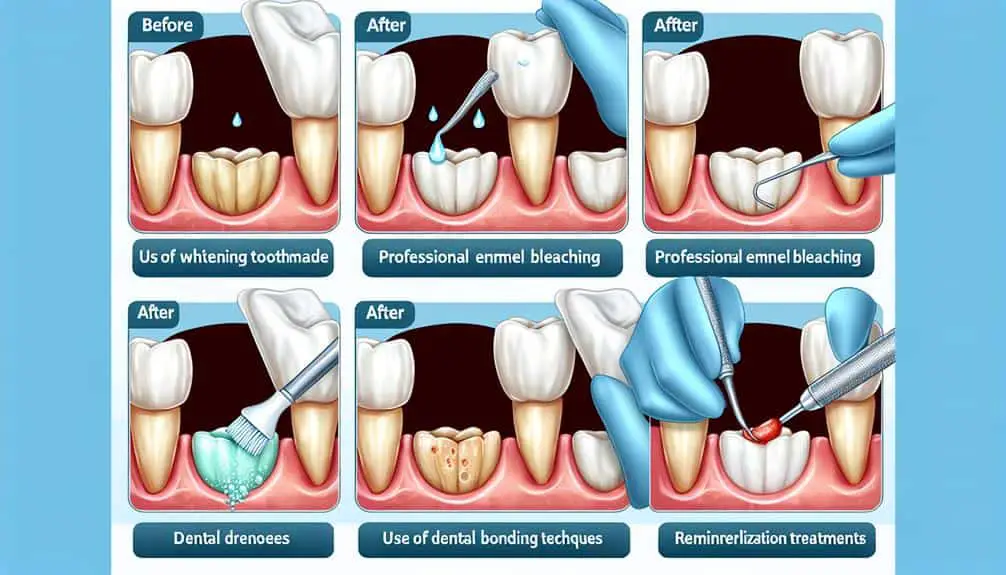To revitalize your enamel, focus on protection by incorporating enamel-strengthening products into your oral care routine. Factors like acidic foods and poor hygiene can erode enamel, leading to discoloration and cavities. Address enamel discoloration from dietary habits, genetics, and aging by consulting with your dentist for the best whitening method. Professional treatments and natural remedies like baking soda can help. Follow safety protocols, brush with fluoride toothpaste, and floss daily. Enhance your smile and maintain enamel health with these strategies.
Key Points
- Consult a dentist for safe whitening methods.
- Use ADA-approved products for enamel safety.
- Follow instructions to prevent enamel harm.
- Opt for professional treatments for significant whitening.
- Incorporate natural remedies for maintaining a white smile.
Understanding Enamel Damage
To understand enamel damage, consider it as the vital outer layer of your teeth that can wear down over time due to various factors. Enamel serves as a shield against decay and sensitivity, but it's susceptible to erosion from acidic foods, poor oral hygiene, and teeth grinding.
When enamel is compromised, it can lead to issues like cavities and discoloration. To prevent further damage, it's important to focus on enamel protection through proper oral care routines. Brushing with fluoride toothpaste, using a soft-bristled toothbrush, and avoiding sugary and acidic foods can help maintain enamel health.
Additionally, incorporating enamel-strengthening products into your routine, such as fluoride mouthwash or remineralizing toothpaste, can aid in repairing enamel. If you have concerns about enamel damage, consulting with a dental professional for personalized advice on enamel protection and repair is recommended to safeguard the longevity of your teeth's protective layer.
Causes of Enamel Discoloration
Enamel discoloration on your teeth can be caused by various factors, including dietary habits, genetics, lifestyle habits, and aging. Dietary factors play a significant role in enamel discoloration. Consuming foods and beverages like coffee, tea, red wine, and certain fruits can stain your teeth over time. Additionally, acidic foods and drinks can erode the enamel, making it more prone to discoloration.
Genetics also play a part in determining the natural color of your enamel. Some people may have inherently darker or more yellowish enamel due to their genetic makeup. Lifestyle habits such as smoking or tobacco use can accelerate enamel discoloration. The chemicals in tobacco products can cause stubborn stains that are challenging to remove.
As you age, the enamel on your teeth naturally wears down, exposing the yellowish dentin underneath. This can lead to a duller and more discolored appearance over time. Understanding these causes of enamel discoloration can help you make informed choices to prevent and address this issue effectively.
Best Whitening Methods for Enamel
For best results in whitening your teeth, consider utilizing professional dental treatments recommended by your dentist. Professional treatments, such as in-office whitening procedures, can provide quick and effective results by utilizing high concentrations of whitening agents. These treatments are supervised by dental professionals, ensuring safety and efficacy.
If you prefer a more natural approach, some natural remedies may help whiten your enamel. Baking soda, for example, has mild abrasive properties that can help remove surface stains when utilized as a toothpaste. Additionally, activated charcoal is gaining popularity for its ability to bind to substances, including stains on the teeth, and remove them effectively. However, using these natural remedies cautiously and consulting with your dentist is crucial to avoid any potential damage to your enamel.
While natural remedies can be beneficial for maintaining a white smile, for significant whitening results, professional treatments remain the most reliable option. Consult with your dentist to determine the best whitening method suited to your individual needs.
How to Safely Whiten Enamel
Considering the importance of maintaining enamel health while pursuing teeth whitening, it's imperative to adopt safe practices that prioritize the integrity of your teeth.
To safely whiten enamel, follow these preventive measures:
- Consult a Dentist: Before starting any whitening treatment, consult your dentist to verify your teeth and gums are healthy and suitable for whitening procedures.
- Use ADA-Approved Products: Choose whitening products that are endorsed by the American Dental Association (ADA) to ensure they meet safety and efficacy standards.
- Follow Instructions: Read and follow the instructions provided with the whitening products carefully to prevent overuse or misuse that may harm your enamel.
- Try DIY Remedies with Caution: If opting for DIY remedies like baking soda or hydrogen peroxide, use them sparingly and be aware of potential risks such as enamel erosion.
Maintaining Enamel Health
To maintain the health of your enamel, it's essential to establish a consistent oral care routine that includes proper brushing and flossing techniques. Preventive measures play an important role in preserving enamel integrity. Brush your teeth at least twice a day using fluoride toothpaste and a soft-bristled toothbrush to avoid enamel erosion. Remember to floss daily to remove plaque and food particles that can contribute to enamel damage and cavities.
In addition to your oral care routine, dietary habits can have a big impact on enamel health. Limit sugary and acidic foods and beverages that can weaken enamel over time. Instead, opt for enamel-strengthening foods like dairy products, leafy greens, and lean proteins. Drinking water throughout the day can help rinse away harmful substances and maintain a healthy pH balance in your mouth.
Frequently Asked Questions
Can Enamel Damage Be Reversed Completely or Just Improved?
Enamel damage can be improved through various methods, such as enamel protection with dental products. Research on enamel regeneration shows promise, suggesting that while complete reversal may be challenging, significant improvement is achievable with the right care.
Are There Any Natural Remedies for Whitening Enamel That Are Safe and Effective?
Starting on a quest for DIY remedies can be rewarding, yet proceed cautiously. Natural methods like baking soda or activated charcoal offer gentler options with fewer risks, compared to chemical treatments. Consider pros and cons wisely.
How Often Should I Whiten My Teeth to Maintain Enamel Health?
To maintain enamel health, whiten your teeth every 6-12 months. Over-whitening can damage enamel, so follow guidelines from your dentist. Consider enamel restoration techniques like fluoride treatments. Always prioritize enamel health over excessive whitening for a bright, healthy smile.
Is It Possible to Over-Whiten Your Teeth and Damage the Enamel?
You can damage your enamel by over-whitening, leading to enamel sensitivity and erosion. Most enamel whitening products are safe within recommended usage. Balance is key for best results without harming your enamel.
Are There Any Specific Foods or Drinks to Avoid in Order to Prevent Enamel Discoloration?
To prevent enamel discoloration, avoid enamel staining foods and beverages like coffee or red wine. Opt for an enamel-friendly diet rich in fruits and vegetables. Choose water over sugary drinks to maintain a healthy smile.



